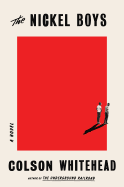
The Nickel Boys forgoes the fantastical touches of Colson Whitehead's previous book, the Pulitzer Prize-winning novel The Underground Railroad, for a no-less-harrowing account of a vicious reform school in the Jim Crow-era South.
Whitehead's protagonist is Elwood Curtis, a black boy living in Tallahassee, Fla., in the early 1960s. Elwood is something of an idealist, listening repeatedly to a recording of Martin Luther King Jr.'s speeches and taking to heart his moral vision. Elwood clings to this code even when it is repaid by cruel trickery and, eventually, an encounter with police that cuts short his promising future and sends him to the Nickel Academy.
The Nickel Academy falls far short of its billing as a "reform school." In reality, the students are underfed, segregated and viciously beaten. Some students fare even worse.
At the heart of The Nickel Boys lies the question of how best to respond to the evils of the world. Whitehead shows how difficult it is to put Martin Luther King Jr.'s self-sacrificing ideals into practice, to remain optimistic in the face of bottomless violence and cruelty. Elwood is challenged by fellow student Turner, for whom the problem lies deeper than surface-level inequality: "You can change the law but you can't change people and how they treat each other... the way Turner saw it, wickedness went deeper than skin color.... It was people." Long after students leave the reform school, the Nickel Academy's lessons seem almost impossible to unlearn. Elwood may be naïve, but his convictions give him strength. --Hank Stephenson, bookseller, Flyleaf Books, Chapel Hill, N.C.

